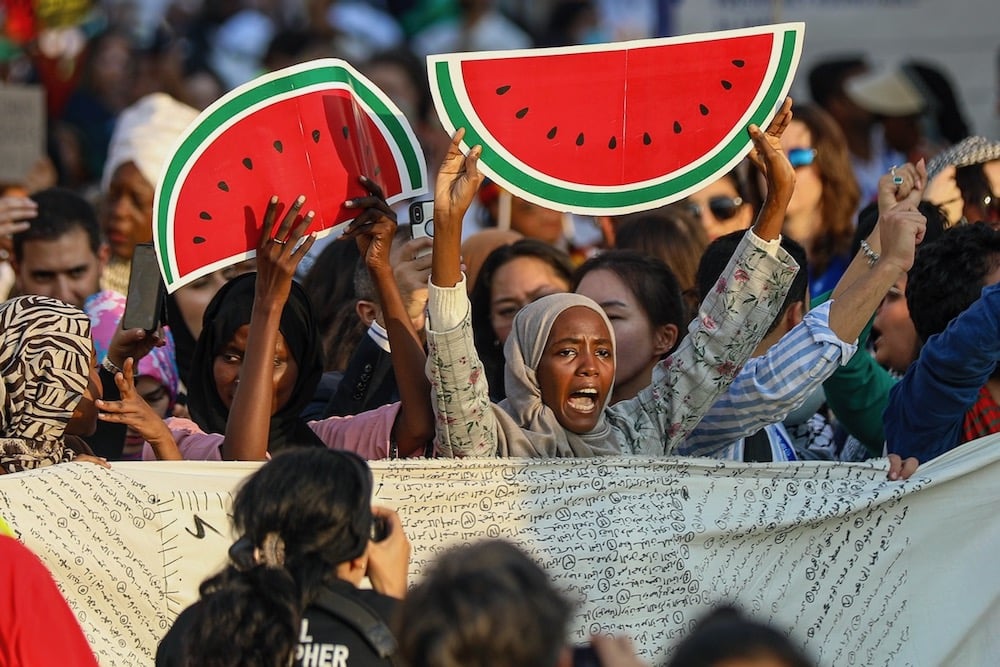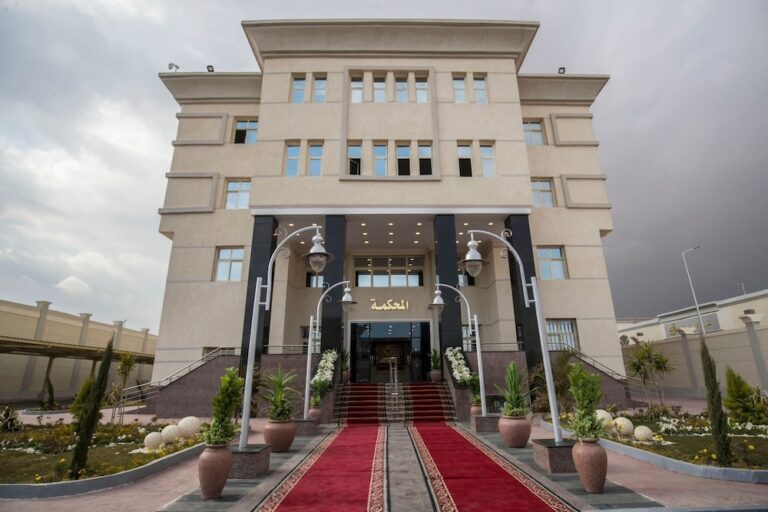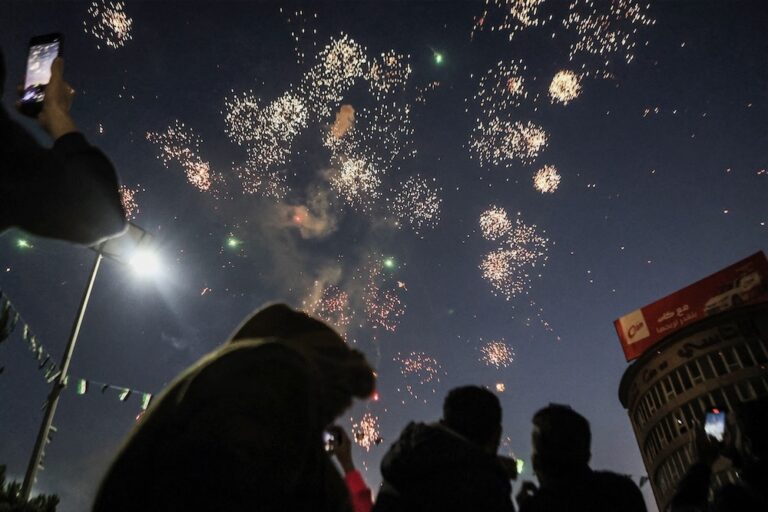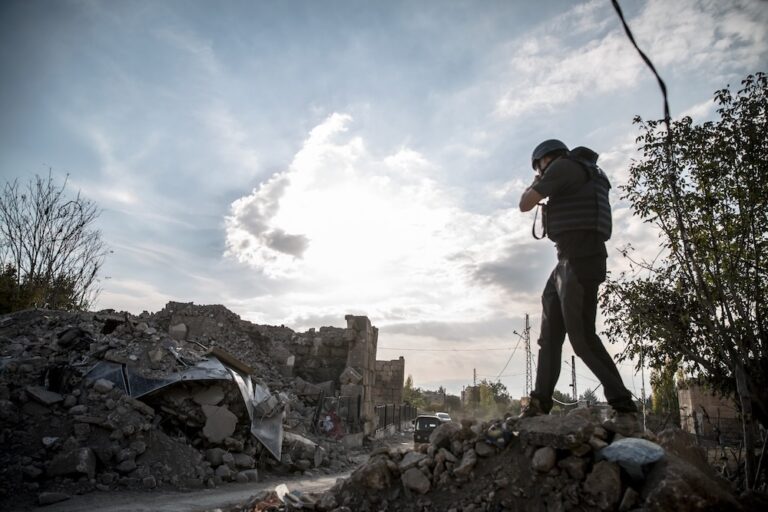November 2023 in MENA: A free expression round up produced by IFEX’s Regional Editor Naseem Tarawnah, based on IFEX member reports and news from the region.
Palestinian journalists and their families face Israel’s targeted killings, COP28 climate summit in the UAE unfolds in a restrictive civic space, and Lebanon’s parliament discusses controversial media law behind closed doors.
Israel targets Gaza’s journalists with nowhere to go
Emboldened by a glaring lack of deterrence, the dire consequences of impunity have become starkly evident in recent weeks as Israel’s ongoing war on Gaza killed at least 64 Palestinian journalists and media workers there. “Since 7 October, the Palestinian territory has been subjected to a veritable eradication of journalism,” said Reporters Without Borders (RSF), highlighting the cases of targeted journalists.
Fueling the impunity have been smear campaigns aimed at discrediting Palestinian journalists and legitimizing their killing. Israeli media and leading public figures helped bolster a narrative that likened journalists covering the war within Gaza to terrorists.
Eight family members of photojournalist Yasser Qudih were killed when their house in southern Gaza was struck by four missiles, with Qudih surviving the attack. It came five days after he and other journalists were falsely accused of having prior knowledge of the 7 October attack, prompting death threats against him online.
Israeli Prime Minister Benjamin Netanyahu’s office said on X: “These journalists were accomplices in crimes against humanity; their actions were contrary to professional ethics.” Danny Danon, a member of parliament, called for the “elimination” of photojournalists “who participated in covering the massacre”.
An investigation by +972 Magazine and Local Call revealed how the Israeli army has used an AI system called Habsora (“the Gospel”) to rapidly generate targets that are mostly residential homes, killing entire families in the process and facilitating what the investigation called “a mass assassination factory”.
The report revealed that the majority of cases involved no military activities in the targeted homes, many belonging to journalists’ families. This includes the home of UK-based Palestinian journalist Ahmed Alnaouq in Deir al-Balah, where 21 family members were lost to an Israeli airstrike.
Many journalists have also been killed in their homes alongside their families, including Duaa Sharaf, Salma Makhaimer, Salam Mema, and Roshdi Sarraj. The director of the Palestinian online news agency Quds News, Hassouna Sleem, and freelance photojournalist Sary Mansour were killed in an Israeli strike 24 hours after receiving an online death threat linked to their work.

Manhattan, New York, USA, 6 November 2023. People light candles during an event commemorating the journalists who lost their lives as a result of Israeil attacks in Gaza. Fatih Aktas/Anadolu via Getty Images
One of Gaza’s most prominent writers and intellectuals Dr. Refaat al-Areer was killed in his sister’s home in Gaza city, in what Euro-Med Monitor reports was a surgical strike of the second floor apartment in a 3-story building. Displaced multiple times throughout the current war, Al-Areer was subject to numerous online death threats and reportedly received an anonymous phone call from someone claiming to be an Israeli officer, who informed the Gazan poet that Israeli forces knew “precisely the school where he was located and were about to get to his location.”
Others targeted include prominent journalist Bilal Jadallah, who was also killed by an Israeli strike targeting his car while he was attempting to flee from Gaza City. Director of the non-profit Press House Palestine, Jadallah provided crucial research for CPJ’s May 2023 report “Deadly Pattern” that revealed a complete lack of accountability in Israeli military killings of journalists over the past two decades.
On 22 November, an Israeli airstrike hit Al Jazeera reporter Anas Al-Sharif’s family home in the Jabalia refugee camp, killing his 90-year-old father. The journalist reported receiving threatening phone calls from Israeli military officers instructing him to cease coverage and leave northern Gaza. Al-Sharif also received WhatsApp voice notes disclosing his location.
Al Jazeera correspondent Moamen Al Sharafi also lost 22 members of his family in an Israeli air attack on a home in the Jabalia refugee camp where they were sheltering.
After having to evacuate northern Gaza, journalists were told by Israel to gather at the Rafah border with Egypt without being able to cross. Trapped within the territory, many journalists posted their parting messages in case they should be killed.
Journalists and writers have also faced arbitrary detentions by Israeli forces throughout the Occupied Palestinian Territories. Palestinian poet Mosab Abu Toha was abducted for two days by Israeli troops while attempting to flee towards the Rafah border crossing with his family. Abu Toha was reportedly taken to an Israeli prison where he was beaten and interrogated before being released.
Journalist Diaa Al-Kahlout, a correspondent for Al-Araby Al-Jadeed, was detained at gunpoint by Israeli forces along with his relatives and other civilians from Beit Lahia in northern Gaza. Footage of the detained men, who were forced to strip and kneel by Israeli forces while their hands were bound, circulated online. His whereabouts remain unknown.
Palestinian activist and writer Ahed Tamimi was taken from her home in the West Bank and arbitrarily detained in an Israeli prison where she was assaulted along with other detainees, and held incommunicado for three weeks before being released.
Lebanese reporter Farah Omar and videographer Rabih Al Maamari of Al-Mayadeen TV were killed by an Israeli strike in southern Lebanon on 21 November while covering back-and-forth fire between Israeli forces and Hezbollah. The attack came days after Israel’s security cabinet shut down the broadcast of the Beirut-based TV station, leading the station to conclude that its journalists were deliberately targeted.
Meanwhile, the Israeli parliament passed an amendment to the terrorism law on 7 November, introducing the potential for a one-year prison sentence for those deemed to be “systematically and continuously consuming terrorist publications.”
Although the amendment excludes publications “providing information to the public,” its vague language leaves room for broad interpretation and raises concerns about its impact on press freedom.
The move comes in the wake of the Israeli information minister calling the Qatari TV news channel Al Jazeera a “propaganda” outlet for “terrorist organizations”. According to RSF, should this characterisation gain official status, it not only puts Al Jazeera at risk of being banned but subjects viewers to potential prosecution under the newly adopted amendment.
Impunity and growing demands for urgent accountability
Israel’s systematic targeting of Palestinian journalists and their families, coupled with arrests and threats in the Occupied Territories, has seen a sinister campaign to silence voices in the region unfold with total impunity. But efforts to hold Israel accountable for war crimes against journalists have already begun to emerge.
Four independent investigations carried out by Human Rights Watch (HRW), Amnesty International, AFP and Reuters confirmed that two deliberate Israeli strikes were responsible for the killing of Lebanese journalist Issam Abdallah and the injury of six other journalists.
“This is not the first time that Israeli forces have apparently deliberately attacked journalists, with deadly and devastating results. Those responsible need to be held to account, and it needs to be made clear that journalists and other civilians are not lawful targets.”
Ramzi Kaiss, Lebanon researcher at Human Rights Watch
Marking the International Day to End Impunity for Crimes against Journalists, IFEX member the Palestinian Center for Development and Media Freedoms (MADA) called for the establishment of an international tribunal to prosecute those accountable for journalist killings that continues to echo with urgency, stating:
“MADA Center considers that impunity is a real danger to journalists and media professionals, the results of which became clear during the past days in which the occupation authorities went so far as to kill journalists in a way that we have never witnessed before. The lack of deterrence against the perpetrators of these crimes gives them the space to commit more crimes and commit violations without fear of punishment.”
Rights groups also joined MADA’s call for the UN to condemn Israel’s systematic targeting of Palestinian journalists and media outlets.
In Lebanon, IFEX member Maharat Foundation also marked the day by underscoring the staggering killing of journalists in recent weeks:
“The international community must seriously work on implementing treaties, resolutions, and commitments that protect journalists, while also holding their attackers and killers accountable. Otherwise, we may witness the legitimization of journalist killings and the suppression of what the UN Secretary-General referred to as collective punishment for the Palestinian people.”
At COP28: Restricted protests, censorship, and renewed persecution of Emirati activists
The UAE’s hosting of the COP28 climate summit between 30 November and 12 December put the country’s human rights record and restricted civic space under a global spotlight.
Amnesty International said rules and guidelines for protests and actions at the summit in Dubai were unusually strictly enforced by the UN. Securing approval for activities in the UN-administered “Blue Zone” was reportedly challenging, with activists risking expulsion for unauthorized actions. This included 12-year old climate activist Licypriya Kangujam from India, who was escorted out after storming the stage during an event to protest fossil fuels.
According to the group, extensive video surveillance created an intimidating atmosphere, while strict UAE laws criminalizing dissent deterred protests outside the designated UN-administered space. Tunisian climate activist Raouf Ben Mohamed said activists were warned not to call out countries by name or rally outside the conference grounds.
Pro-Palestinian protesters calling for a cease-fire and climate justice were prohibited from naming the parties involved, while activists bypassed rules banning national flags by wearing keffiyehs and holding watermelon signs to express solidarity with the Palestinians.
A protest organized by Amnesty International and HRW to call for the freedom of detained activists in the country and region was only permitted after censoring their posters. They featured cases like Egyptian-British activist Alaa Abdel Fattah and Emirati human rights defenders like Ahmed Mansoor, Khaled Al-Nuaimi, Dr. Al-Roken, Dr. Al-Mansoori and Mohamed Al-Siddiq.
While the climate talks continued, authorities held the first hearing of a case that saw new terrorism charges brought against 87 imprisoned Emiratis, including 60 activists belonging to the UAE94, as well as writer Ahmed Mansoor and academic Dr. Nasser Bin Ghaith. Already being held past their sentences, the activists could now face life imprisonment or the death penalty if convicted of these new charges.
Lebanon’s new media law
Rights groups have warned that a proposed new media law being discussed in Lebanon’s parliament poses a grave threat to freedom of expression. The Lebanese Parliament’s Administration and Justice Committee has been engaged in closed-door discussions to finalize a controversial law that, if approved, rights groups say would severely curtail press freedom and access to information.
The draft law, reviewed by the Coalition to Defend Freedom of Expression in Lebanon, upholds criminal penalties and, in certain cases, increases prison sentences and fines for insults and defamation, echoing a troubling trend where defamation laws are weaponized to silence critics.
The stifling legislation also limits journalists’ rights to form associations, permitting only one media syndicate, and obstructs public access to vital information by prohibiting the publication of government session minutes, the decisions of parliamentary committees, and investigations conducted by the Central Inspection and Administrative Inspection Department. Moreover, the draft introduces onerous fees and licensing requirements for media outlets.
“It is deeply concerning that the draft law is being privately discussed and hidden from public scrutiny, while the spotlight is fixed on the ongoing Israeli attacks in South Lebanon since October 7 – that have led to the tragic killing of at least 14 civilians,” said the Coalition to Defend Freedom of Expression in Lebanon.
Urging the parliament, the coalition called for legislative deliberations in parliamentary committees to be made public, and to allow for meaningful input from civil society on the draft media law, while ensuring the legislation meets international standards.



